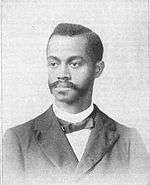Charles Henry Turner (zoologist)
| Charles Henry Turner | |
|---|---|
|
Charles Henry Turner aged about 56 | |
| Born |
February 3, 1867 Cincinnati, Ohio |
| Died |
February 14, 1923 (aged 56) Chicago |
| Nationality | United States |
| Fields | zoology |
Charles Henry Turner (February 3, 1867 – February 14, 1923) was an American research biologist, educator, zoologist, and comparative psychologist born in Cincinnati, Ohio.
In 1892, Turner became the first African American to receive a graduate degree at the University of Cincinnati.
In 1907, he became the first African American to earn a Ph.D. from the University of Chicago.
Despite his doctorate, Turner chose to teach at high schools. Most sources attribute this career move to a desire to devote more time to the observation of insects, but Charles I. Abramson, in his 2003 article on Turner for American Bee Journal, claims that Turner was unable, rather than unwilling, to get an appointment at the University of Chicago, and that the Tuskegee Institute could not afford his salary.
Turner published 49 papers on invertebrates, including Habits of Mound-Building Ants, Experiments on the Color Vision of the Honeybee, Hunting Habits of an American Sand Wasp, and Psychological Notes on the Gallery Spider. In his research, Turner became the first person to prove that insects can hear and can distinguish pitch. In addition, he first discovered that cockroaches can learn by trial and error and that honeybees can see color.
Besides his scientific work, Turner was active in the struggle to obtain social and educational services for African Americans in St. Louis, Missouri. After his death, a school for disabled African American children was named in his honor.
He died on February 14, 1923 from acute myocarditis in Chicago. His place of interment is Lincoln Cemetery in Chicago.
References
- Gregory A. Kimble, Michael Wertheimer, C. Alan Boneau, Charlotte White, American Psychological Association Division of General Psychology, American Psychological Association (1991). Portraits of pioneers in psychology. Routledge. ISBN 0-8058-5930-6.
- Abramson, Charles I (2009). "A study in inspiration: Charles Henry Turner (1867–1923) and the investigation of insect behavior". Annual Review of Entomology. United States. 54: 343–59. doi:10.1146/annurev.ento.54.110807.090502. ISSN 0066-4170. PMID 18817509.
External links
- http://psychology.okstate.edu/museum/turner/turnermain.html
- http/blackinventor.comA page on Turner from the African American Registry
- Charles Henry Turner at Fact Monster
- Project Gutenberg eBook Twentieth Century Negro Literature
- CHT – Biography at psychology.okstate.edu C. I. Abramson's biography of Turner
